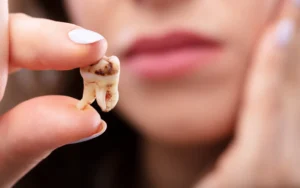Missing teeth can significantly impact both your confidence and daily life, making it challenging to eat, speak, and smile comfortably. Fixed dentures offer a permanent solution that restores your natural appearance and function. At Encino’s leading dental services, these prosthetic devices are custom-designed to fit securely and look natural. Understanding how fixed dentures work and what the installation process involves can help you make informed decisions about your dental health. This guide walks you through everything you need to know about fixed dentures, from the different types available to proper care and maintenance.
Understanding Fixed Dentures
Fixed dentures, also known as permanent dentures, are prosthetic devices that replace missing teeth. Unlike removable dentures, these stay permanently attached to dental implants or your existing teeth. The structure typically features a metal or ceramic framework that supports artificial teeth made from durable materials, such as porcelain. This design creates a stable base that won’t shift or move when you eat or talk. Fixed dentures restore your ability to chew properly, speak clearly, and smile confidently. Each set is custom-made to fit your mouth comfortably and look completely natural.
Types of Fixed Dentures
Different types of fixed dentures are available depending on your specific needs. The traditional fixed bridge uses crowns on the teeth next to the gap, with a prosthetic tooth filling the space between them. A cantilever bridge works when you only have one tooth available for support on one side. Maryland bridges attach to the back of nearby teeth using a metal or porcelain frame. Implant-supported bridges connect directly to dental implants placed in your jawbone for maximum stability. Fixed partial dentures, also known as dental bridges, can replace one or more missing teeth and are permanently cemented in place. Your dentist will recommend the best option based on your individual situation.
Benefits of Fixed Dentures
Fixed dentures provide a long-lasting and reliable solution for tooth replacement. Here are the key advantages:
- Strong Stability: Fixed dentures attach securely to dental implants or existing teeth, creating a solid foundation for eating and speaking without worry about slipping.
- Natural Appearance: These dentures are designed to resemble your natural teeth and can be matched to your existing teeth, providing a beautiful, confident smile.
- Long-Lasting Solution: With good care, fixed dentures can last many years, making them a worthwhile investment in your oral health.
- Protects Jawbone: By stimulating the jawbone, fixed dentures help prevent the bone loss that often happens when teeth are missing.
- Easy to Live With: Fixed dentures don’t require removal for cleaning, making daily life simpler and more comfortable.
The Installation Process
Installing fixed dentures happens in several careful steps. Your dentist first examines your mouth to find the best placement for the dentures. Any necessary preparatory work, such as removing damaged teeth or adjusting the gum tissue, will be done next. Then, dental implants are surgically placed into your jawbone to act as anchors. After the implants have healed and bonded with the bone, small connectors called abutments are attached to support the prosthetic. Finally, your custom-made fixed dentures are firmly attached to the abutments, creating a stable and functional fit. Regular check-ups help monitor your dentures and ensure they continue to function optimally.
Aftercare for Fixed Dentures
Taking care of your fixed dentures ensures they continue to function properly for years to come. Follow these simple guidelines:
- Brushing: Clean your fixed dentures daily using a soft-bristle brush and gentle toothpaste.
- Flossing: Regularly floss around the dentures to remove food particles and plaque.
- Rinsing: Use an antiseptic mouthwash to maintain good oral hygiene.
- Food Choices: Avoid hard or sticky foods that could damage the dentures or supporting structures.
- Dental Visits: Schedule routine check-ups so your dentist can verify the fit and function of your dentures.
Maintenance Tips for Fixed Dentures
Following a simple maintenance routine helps your fixed dentures function optimally. Clean them daily with a non-abrasive brush and mild toothpaste to avoid scratching the surface. An antimicrobial mouth rinse helps control bacteria and maintain your mouth’s health. Regular dental visits are necessary for checking the fit and condition of your dentures, making sure they stay comfortable and work properly. Stay away from hard or sticky foods to prevent damage and extend the life of your dentures. If you notice any problems like looseness or discomfort, contact your dentist right away for adjustments. Good maintenance preserves the appearance of your fixed dentures and supports your overall oral health.
Related Topics:






